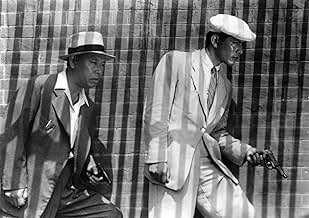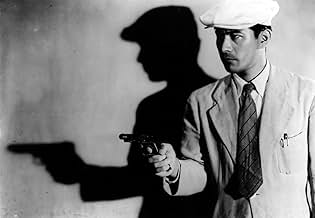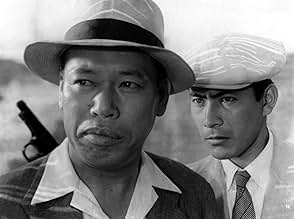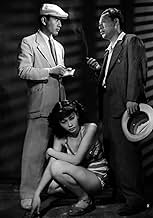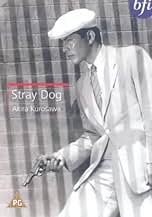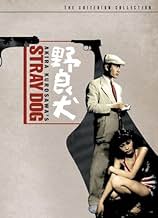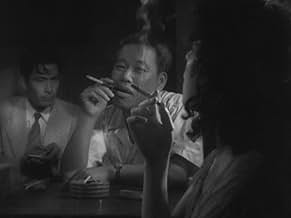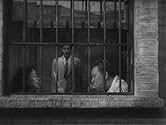IMDb-BEWERTUNG
7,8/10
19.471
IHRE BEWERTUNG
In einem brütend heißen Sommer begibt sich ein Neuling bei der Mordkommission auf die Suche nach seiner gestohlenen Pistole.In einem brütend heißen Sommer begibt sich ein Neuling bei der Mordkommission auf die Suche nach seiner gestohlenen Pistole.In einem brütend heißen Sommer begibt sich ein Neuling bei der Mordkommission auf die Suche nach seiner gestohlenen Pistole.
- Auszeichnungen
- 4 wins total
Handlung
WUSSTEST DU SCHON:
- WissenswertesMuch of the film was filmed from the slum streets of post war Japan. These were filmed under chief assistant director Ishirô Honda, who had gone with camera operator Kazuo Yamada into some dangerous, even yakuza run, territory. Many of the scenes of Toshirô Mifune's character from the waist down are actually Honda standing in. In his book, Something Like an Autobiography, Akira Kurosawa described Honda's role stating, "I had Honda do mainly second-unit shooting. Everyday I told what I wanted and he would go out into the ruins of postwar Tokyo to film. There are few men as honest and reliable as Honda. He faithfully brought back exactly the footage I requested, so almost everything he shot was used in the final cut of the film. I'm often told that I captured the atmosphere of postwar Japan very well in Stray Dog, and if so I owe a great deal of that success to Honda."
- PatzerAt one point, there is a man playing a tune on a harmonica that needs two people with harmonicas to play.
- Zitate
Police Inspector Nakajima: Bad luck either makes a man or destroys him. Are you gonna let it destroy you? Depending how you take it, bad luck can be a big break.
- VerbindungenFeatured in The Story of Film: An Odyssey: Sex & Melodrama (2011)
- SoundtracksThe Waves of the Danube
(uncredited)
Composed by Iosif Ivanovici
[Played on a harmonica outside the bar when Murakami follows Ogin]
Ausgewählte Rezension
The following year, 1950, would see Kurosawa achieve his first major international success with the masterpiece Rashomon. Here, Kurosawa doesn't quite have the sureness of touch which would characterize most of his career, but Stray Dog is nevertheless a fine film noir and an effective exploration of Kurosawa's ideas about postwar Japan in particular and the human condition in general.
As you might expect from such a genius, Kurosawa is not satisfied with a simple good-guys/bad-guys cops-and-robbers story. He explores in depth the social and economic conditions in postwar Japan which led many young people--particularly returning veterans--to take to crime, and also the particular circumstances which motivate the acts of Yusa (Isao Kimura), the criminal. Indeed, a series of mistakes by the hero, rookie detective Murakami (Toshiro Mifune), are one factor behind Yusa's crimes.
But neither is Stray Dog a facile blame-society message film, either. Kurosawa makes no excuses for Yusa. By giving Murakami a very similar history (so similar, in fact, that it comes off as a little contrived), Kurosawa makes the point that Yusa had the same choice as Murakami. That he chose differently is his responsibility.
But even more interesting to me is the character of chief detective Sato (Takashi Shimura), Murakami's superior officer, mentor, and friend.
Sato is the wise elder figure in this film, and in the hands of a lesser artist than Kurosawa, such a character generally ends up as a mouthpiece for the director's own viewpoint. Here, though, Kurosawa permits Sato to espouse a hardcore law-and-order philosophy: The cops are the good guys, the crooks are the bad guys, and that's it. Sato has no patience for Murakami's guilt feelings or touchy-feely philosophizing.
That Kurosawa would permit this view (which is not Kurosawa's view, nor the film's) to be given voice by the film's wisest, kindest, most competent, and most likable character is a mark of his confidence and courage.
As you might expect from such a genius, Kurosawa is not satisfied with a simple good-guys/bad-guys cops-and-robbers story. He explores in depth the social and economic conditions in postwar Japan which led many young people--particularly returning veterans--to take to crime, and also the particular circumstances which motivate the acts of Yusa (Isao Kimura), the criminal. Indeed, a series of mistakes by the hero, rookie detective Murakami (Toshiro Mifune), are one factor behind Yusa's crimes.
But neither is Stray Dog a facile blame-society message film, either. Kurosawa makes no excuses for Yusa. By giving Murakami a very similar history (so similar, in fact, that it comes off as a little contrived), Kurosawa makes the point that Yusa had the same choice as Murakami. That he chose differently is his responsibility.
But even more interesting to me is the character of chief detective Sato (Takashi Shimura), Murakami's superior officer, mentor, and friend.
Sato is the wise elder figure in this film, and in the hands of a lesser artist than Kurosawa, such a character generally ends up as a mouthpiece for the director's own viewpoint. Here, though, Kurosawa permits Sato to espouse a hardcore law-and-order philosophy: The cops are the good guys, the crooks are the bad guys, and that's it. Sato has no patience for Murakami's guilt feelings or touchy-feely philosophizing.
That Kurosawa would permit this view (which is not Kurosawa's view, nor the film's) to be given voice by the film's wisest, kindest, most competent, and most likable character is a mark of his confidence and courage.
- counterrevolutionary
- 24. Jan. 2005
- Permalink
Top-Auswahl
Melde dich zum Bewerten an und greife auf die Watchlist für personalisierte Empfehlungen zu.
- How long is Stray Dog?Powered by Alexa
Details
Box Office
- Bruttoertrag in den USA und Kanada
- 46.808 $
- Eröffnungswochenende in den USA und in Kanada
- 15.942 $
- 28. Juli 2002
- Weltweiter Bruttoertrag
- 46.961 $
- Laufzeit2 Stunden 2 Minuten
- Farbe
- Sound-Mix
- Seitenverhältnis
- 1.37 : 1
Zu dieser Seite beitragen
Bearbeitung vorschlagen oder fehlenden Inhalt hinzufügen

Oberste Lücke
By what name was Ein streunender Hund (1949) officially released in Canada in French?
Antwort

